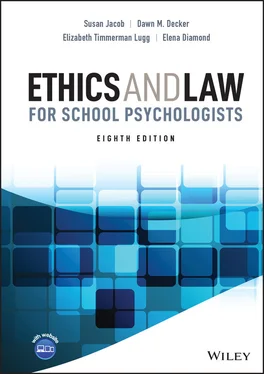Susan Jacob - Ethics and Law for School Psychologists
Здесь есть возможность читать онлайн «Susan Jacob - Ethics and Law for School Psychologists» — ознакомительный отрывок электронной книги совершенно бесплатно, а после прочтения отрывка купить полную версию. В некоторых случаях можно слушать аудио, скачать через торрент в формате fb2 и присутствует краткое содержание. Жанр: unrecognised, на английском языке. Описание произведения, (предисловие) а так же отзывы посетителей доступны на портале библиотеки ЛибКат.
- Название:Ethics and Law for School Psychologists
- Автор:
- Жанр:
- Год:неизвестен
- ISBN:нет данных
- Рейтинг книги:3 / 5. Голосов: 1
-
Избранное:Добавить в избранное
- Отзывы:
-
Ваша оценка:
- 60
- 1
- 2
- 3
- 4
- 5
Ethics and Law for School Psychologists: краткое содержание, описание и аннотация
Предлагаем к чтению аннотацию, описание, краткое содержание или предисловие (зависит от того, что написал сам автор книги «Ethics and Law for School Psychologists»). Если вы не нашли необходимую информацию о книге — напишите в комментариях, мы постараемся отыскать её.
Ethics and Law for School Psychologists
Ethics and Law for School Psychologists
Ethics and Law for School Psychologists — читать онлайн ознакомительный отрывок
Ниже представлен текст книги, разбитый по страницам. Система сохранения места последней прочитанной страницы, позволяет с удобством читать онлайн бесплатно книгу «Ethics and Law for School Psychologists», без необходимости каждый раз заново искать на чём Вы остановились. Поставьте закладку, и сможете в любой момент перейти на страницу, на которой закончили чтение.
Интервал:
Закладка:
STATUTES AND REGULATIONS
A second source of law in the U.S. legal system is statutory law. The U.S. government is composed of three parallel systems of government at the federal, state, and local levels, a form of government known as federalism (H. R. Turnbull & Turnbull, 2000). At the federal level, the Constitution is the basic law of the land. Congress is empowered to enact federal laws as long as they do not violate the U.S. Constitution. Similarly, each state has its own constitution and legislative body for enacting laws at the state level. State laws may not violate either state constitutions or the federal constitution.
Many countries have a nationalized school system operated by the central government (Hubsch, 1989). Under the 10th Amendment of the Constitution, Congress is forbidden from creating a nationalized school system. However, the U.S. Congress has the power to shape educational policy and practices by offering monies to states contingent on compliance with federal mandates. This is called categorical aid . Congress has passed two types of legislation that have had a dramatic impact on the public schools, antidiscrimination legislation and federal education legislation . Key federal statutes affecting the schools are highlighted in the paragraphs that follow.
Federal Education Legislation
Some federal education legislation is grant legislation; that is, funds are provided to states on the condition that schools comply with certain educational policies and practices. The Elementary and Secondary Education Act of 1965 and the Individuals with Disabilities Education Act, reauthorized and amended in 2004, are important examples of this type of legislation. Other federal education legislation stipulates that no federal funds will be made available to schools unless they adhere to specific educational policies and practices outlined in the law; the Family Educational Rights and Privacy Act of 1974 (FERPA) is an example of this type of legislation.
Elementary and Secondary Education Act of 1965
As noted previously, education generally has been regarded as a responsibility of state and local governments. The Elementary and Secondary Education Act of 1965 (ESEA; Pub. L. No. 89–750) was one of the first major federal programs to aid education. With the passage of ESEA, Congress accepted the proposition that although “education is primarily a state function … the Federal Government has a secondary obligation to see that there is a basic floor under those essential services for all adults and children in the United States” (Taft, 1965, p. 1450). A major thrust of early amendments of the law was to target funds more specifically for schoolchildren from economically disadvantaged backgrounds.
The most recent re-authorization of ESEA is the Every Student Succeeds Act (ESSA, Pub. L. No. 114–95), signed into law by President Barrack Hussein Obama in 2015. Its purpose is “to provide all children significant opportunity to receive a fair, equitable, and high-quality education” (Sec. 1001). ESSA authorizes federal funds for low-performing schools (defined as schools performing in the bottom 5 percent), for high schools where less than two-thirds of students graduate, and to improve educational outcomes for subgroups of children who chronically struggle to succeed at school (Sec. 111[c][4][C-D]). Funds are also targeted for literacy education, early childhood education, and for children who are English language learners, Native American, migratory, homeless, neglected, delinquent, or at risk for dropping out. In addition, some ESSA funds are provided as block grants to states. Of special importance to school psychology, these funds may be used for “initiatives to expand access to or to coordinate school counseling and mental health programs” (Sec. 4102[b][3][B][ii][II]), and the term school-based mental health services provider is defined to include state-certified or state-licensed school psychologists (Sec. 4102 [6]).
Individuals with Disabilities Education Act
Prior to 1990, the Education for the Handicapped Act (EHA) referred to a series of federal statutes concerning the education of children with handicapping conditions (e.g., Pub. L. No. 94–142). In 1990, President George H. W. Bush signed into law the Education of the Handicapped Act Amendments of 1990 (Pub. L. No. 101–476), which changed the name of EHA to the Individuals with Disabilities Education Act (IDEA). In 1997, President Bill Clinton signed into law the Individuals with Disabilities Education Act Amendments of 1997 (Pub. L. No. 105–117). This Act reauthorized IDEA and introduced several changes to improve the law. Most recently, President George W. Bush signed into law the Individuals with Disabilities Education Improvement Act of 2004 (Pub. L. No. 108–445) which re-authorized and amended IDEA. Additional amendments to IDEA were made in 2015 through the Every Student Succeeds Act (Pub. L. No. 114–95).
IDEA—Part B allocates funds to states that provide a free and appropriate education to all children with disabilities as defined by the law. To receive funds, each state must have developed a plan that offers every child with disabilities an opportunity to receive special education and related services in conformance with an individualized education program (IEP). The school must offer an IEP reasonably calculated to enable a child to make progress appropriate in light of the child’s circumstances. Students must be assessed on the basis of nondiscriminatory testing and evaluation procedures and provided with an IEP in the least restrictive environment appropriate for each child. The “least restrictive environment” is the educational setting selected from a continuum of alternative placements (ranging from a residential facility to the general education classroom) that is closest to the general education classroom but also meets the special education needs of the child with a disability. Individualized education planning decisions are made by a multidisciplinary team that includes the student’s parents, and a number of safeguards are required in the law to ensure parent participation in decision making. IDEA—Part C provides funds to states that offer early intervention programs for infants and toddlers with known or suspected disabilities in conformance with an individualized family service plan (see Chapter 4).
Family Educational Rights and Privacy Act of 1974
The Family Educational Rights and Privacy Act of 1974 (FERPA) was an amendment to the Elementary and Secondary Education Act of 1965 (Pub. L. No. 93–380). Under FERPA, no federal funds will be made available to schools unless they adhere to the student record-keeping procedures outlined in the law. FERPA record-keeping guidelines are designed to safeguard confidentiality of records and parent access to school records concerning their children. In accordance with FERPA, parents have access to all school education records of their children, the right to challenge the accuracy of those records, and the right to a hearing regarding their accuracy. Aside from parents, student records are to be available only to those in the school setting with a legitimate educational interest in the student, and, although there are some exceptions, parent consent generally must be obtained before records are released to agencies outside of the school (see Chapter 3).
Protection of Pupil Rights Amendment
The Protection of Pupil Rights Amendment (PPRA) was a 1978 amendment to the Elementary and Secondary Education Act of 1965. PPRA was amended in 1994 and 2001 (Pub. L. No. 107–110 § 1061). The 2001 amendment requires school districts that receive federal funds to notify parents when the school intends to administer to students a survey, analysis, or evaluation that reveals one or more of eight types of personal information, including political affiliations or beliefs; potentially embarrassing psychological problems; illegal, antisocial, and self-incriminating behavior; sexual behaviors and attitudes; and religious beliefs or practices. It also requires school districts that receive federal funds to ensure that parents have the opportunity to review the content of the survey or other instrument prior to distribution. School districts also must allow parents to have their child opt out of survey participation. Parent consent is required if the survey or other evaluation is funded by the U.S. Department of Education (DOE) (see Chapter 3).
Читать дальшеИнтервал:
Закладка:
Похожие книги на «Ethics and Law for School Psychologists»
Представляем Вашему вниманию похожие книги на «Ethics and Law for School Psychologists» списком для выбора. Мы отобрали схожую по названию и смыслу литературу в надежде предоставить читателям больше вариантов отыскать новые, интересные, ещё непрочитанные произведения.
Обсуждение, отзывы о книге «Ethics and Law for School Psychologists» и просто собственные мнения читателей. Оставьте ваши комментарии, напишите, что Вы думаете о произведении, его смысле или главных героях. Укажите что конкретно понравилось, а что нет, и почему Вы так считаете.












